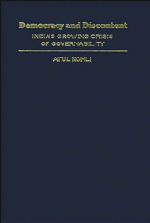Book contents
- Frontmatter
- Contents
- List of tables and figures
- Preface and acknowledgments
- PART I INTRODUCTION
- PART II THE GROWING PROBLEMS OF GOVERNING THE PERIPHERY: POLITICS IN THE DISTRICTS
- PART III ORDER AND BREAKDOWN IN THE STATES
- PART IV CENTRALIZATION AND POWERLESSNESS AT THE CENTER
- Introduction: the Center
- 11 Managing the economy: halfhearted liberalization
- 12 Managing the troubled political institutions: the Congress party and relations with Punjab
- Conclusion: the Center
- PART V FINAL INFERENCES
- Bibliography
- Index
Introduction: the Center
Published online by Cambridge University Press: 05 June 2012
- Frontmatter
- Contents
- List of tables and figures
- Preface and acknowledgments
- PART I INTRODUCTION
- PART II THE GROWING PROBLEMS OF GOVERNING THE PERIPHERY: POLITICS IN THE DISTRICTS
- PART III ORDER AND BREAKDOWN IN THE STATES
- PART IV CENTRALIZATION AND POWERLESSNESS AT THE CENTER
- Introduction: the Center
- 11 Managing the economy: halfhearted liberalization
- 12 Managing the troubled political institutions: the Congress party and relations with Punjab
- Conclusion: the Center
- PART V FINAL INFERENCES
- Bibliography
- Index
Summary
The purpose of this part of the study is to analyze the changing nature of the Indian state at its summit. The foregoing analyses of selected districts and states will help delineate the broad political context within which India's central government (the Center) operates. This context is characterized by weakening political institutions and increasing power struggles. Several questions must now be addressed: How is central authority formed in such a context? Once it has been formed, what strategies do leaders characteristically adopt to cope with the growing problems of governability? How efficacious are the leaders and the state they control in dealing with the pressing problems of the day?
Instead of attacking these complex issues head-on, I have chosen an indirect research strategy. What follows is an analysis of how Rajiv Gandhi sought to deal with what he defined as the priority problems of India during his term in power (1984–9). First, the attempts of the Rajiv government to liberalize India's economy are analyzed. There follows an examination of how Rajiv dealt with a troubled Congress party and with a turbulent Center–state issue, the issue of Punjab.
These foci are clearly selective. They do not show all the nuances that would be revealed by a step-by-step account of how Rajiv came to power and how he used his power over the next five years. Nevertheless, we may note that his attempts to liberalize the economy were aimed at boosting India's economic growth. Similarly, Rajiv's political policies were aimed at strengthening some of India's important but troubled institutions.
- Type
- Chapter
- Information
- Democracy and DiscontentIndia's Growing Crisis of Governability, pp. 303 - 304Publisher: Cambridge University PressPrint publication year: 1991



